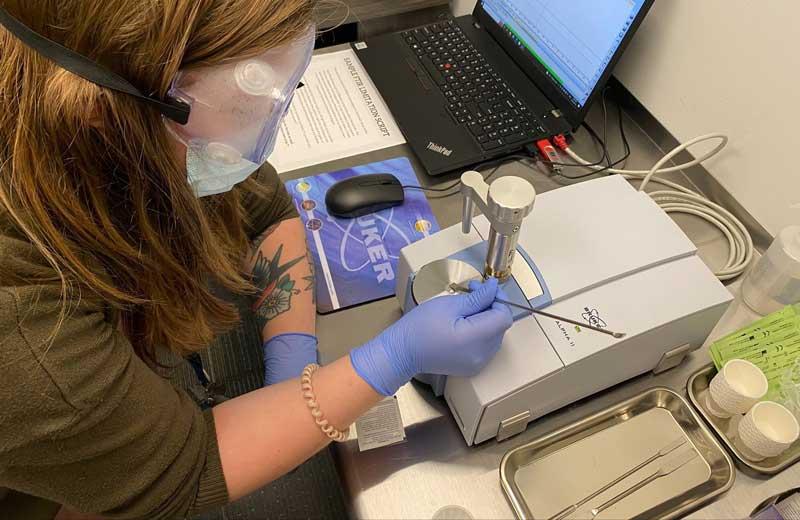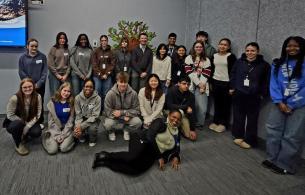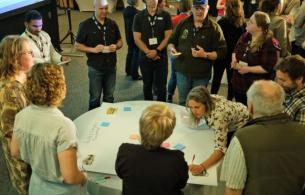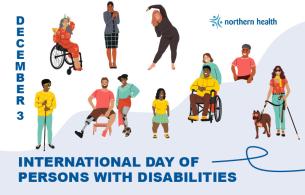Drug checking is one component of Northern Health’s regional drug poisoning (overdose) prevention and response strategy, aimed at creating a low barrier access to life-saving services. The Northwest Specialized Services (NWSS) offers point of care drug checking with a Fourier Transform Infrared (FTIR) spectroscopy machine at the Specialized MHSU Outreach Office in Terrace. Collection sites are accessible via Prince Rupert Specialized MHSU Outreach, Smithers Specialized MHSU Outreach, Kitimat Health Centre, and Ksan Society Terrace. FTIR drug checking is offered in addition to the take home fentanyl test strips available through Northern Health.
“Having an FTIR machine in the North allows us to identify potential irregularities to the substances coming into our communities in real-time,” says one NH Drug Checking Technician. “This allows us to build rapport and establish positive connections with our community members and partners. People have the right to make informed decisions about their substance use. Being able to provide that timely information ensures community members can make the best choice for them amidst an ongoing toxic drug crisis in the province.”
How it works
A trained technician uses the FTIR to analyze the makeup of a drug sample. The FTIR analyzes the sample by shining a light on it and measuring how that light is absorbed. The analysis can tell us what’s in the sample, including what the substance is, and if there are any contaminants. The technician may also be able to tell how much of a certain drug or contaminant is in the sample. Once the analysis is completed, the technician provides the results to the client, along with harm reduction information about their drug sample to help the client come up with a safety plan to help prevent overdose. The analysis takes 10-15 minutes per sample.
FTIR drug checking also creates opportunities for timely, accurate drug alerts to be issued to communities to create broader awareness around specific substances that are flagged. Drug checking is confidential and anonymous.
What to expect at a point-of-care drug checking site:

- A person brings in a small sample to a drug checking service.
- The technician takes a very small sample of the drug (5 mg - the size of half a matchstick head) and analyzes it with the FTIR.
- A second set of tests with a fentanyl test strip and a benzodiazepine test strip are then completed.
- The technician relays the results to the person and provides personalized harm reduction information in relation to the findings of the drug check. Results can be received through text, phone call, email, or in person.
An FTIR cannot operate on its own. The machine must be operated by a trained FTIR technician whose role is to read the information provided by the FTIR and relay both results and harm reduction messaging associated with those results to the client.
What to expect at a collection site:

- A person brings in a small sample to a drug checking service.
- Team member on site (or in community) takes a very small sample of the drug (5 mg or the size of half a matchstick head) and ships the sample to the testing site (Terrace).
- The technician at the testing site (Terrace) receives the sample and completes analysis explained above.
- The technician relays the results to the person and provides individualized harm reduction information in relation to the findings of the drug check. Results can be received through text, phone call, email, or in person.
Positive implications for community
The FTIR drug checking service has many positive impacts onto the community.
- FTIR spectrometers provide more information about a drug sample than a fentanyl test strip on its own.
- The drug checking services make drug analysis more accessible to people in the community.
- The results provided can create opportunities for clients to reduce use or make more informed choices around their substance use.
- Drug checking creates another opportunity for people who use drugs to engage with services and is an opportunity to build trusting relationships with health care services and providers.
- Drug checking helps to inform drug alerts for the broader community if and when substances of concern are identified. The sample data is also shared with our partners at the BC Centre for Substance Use (BCCSU) – we receive monthly data that can identify trends and novel (new) substances that can inform overdose prevention work, keeping public health aware of changes in the drug supply in a timely way.
How to access drug checking by community
Prince Rupert Specialized MHSU Outreach: Samples can be collected in community during staffed hours. Please call: 778-884-0262
- Hours: 7 days/week, 8:30 am to 7 pm
Smithers Specialized MHSU Outreach: Samples can be collected in community or dropped off at Smithers Specialized MHSU Outreach during staffed hours. Please call: 250-847-0203 or 250-643-7456 for more details.
- Location: 3862A Broadway Ave, Smithers BC
- Hours: 7 days/week, 8:30 am to 7 pm
Terrace Specialized MHSU Outreach: Samples can be collected in community or dropped off at Terrace Specialized MHSU Outreach during staffed hours. Please call: 250-615-9395 or 250-631-4647 for more details.
- Location: 101-4450 Greig Ave, Terrace BC
- Hours: Monday to Friday, 8:30 am to 8 pm (stats/weekends: 9:30 am to 8 pm)
Ksan Society – Terrace: Samples can be collected in community or dropped off with Ksan Society. Please call: 250-641-8872 for more details!
- Location: 4444 Lakelse Ave, Terrace BC
- Hours: Monday to Friday, 8:30 am to 4:30 pm
Kitimat Health Centre: Samples can be dropped off at the Kitimat Health Centre during staffed hours. Please call 250-632-3181 ext. 2 for more details!
- Location: 920 Lahakas Boulevard South, Kitimat BC
- Hours: Monday to Friday (stats excluded), 8:30 am to 4:30 pm
NWSS is actively seeking community partnerships to set up additional collection sites across the Northwest, increasing the availability of drug checking services across the region. If your organization is interested in learning more about the role of collection sites, please reach out to: DrugCheckingNW@northernhealth.ca














Comments